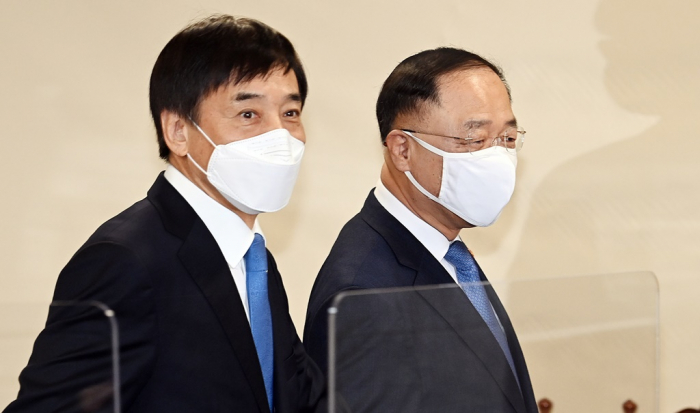
Bank of Korea Governor Lee Ju-yeol (left) and South Korea’s Finance Minister Hong Nam-ki on Feb. 11 attend a meeting on the macroeconomy and financial markets. South Korea’s central bank was caught in a dilemma as it needs to raise interest rates to curb rising inflationary pressure in Asia’s fourth-largest economy with import prices up 30% in January while pushing down government bond yields at the same time.The Bank of Korea plans to buy government bonds in order to stem surging their yields on lawmakers’ push to increase an extra budget ahead of the presidential election next month. The plan contrasted to the BOK’s move to raise the base interest rate and cut liquidity. The purchase of treasury bonds is likely to add to inflationary pressure, some experts criticized.The most liquid three-year Korean treasury on Monday stood at 2.347%, the highest since September 2014 when the BOK’s policy interest rate was at 2.25%, far higher than the current 1.25%.That came as the parliament sought to raise a supplementary budget, fanning expectations of increasing deficit bond issuance. The government initially planned to sell 11.3 trillion won ($9.4 billion) in deficit bonds for the 14 trillion won supplementary budget proposed in January. But the issuance is expected to rise to around 30 trillion won depending on the size of the extra spending.Surging treasury bond yields ramped up corporate borrowing costs to eight-year highs.BOK GOVERNOR PLEDGES TO BUY GOVERNMENT BONDS MORETo stem the rising government bond yields, the BOK on Feb. 7 bought 2 trillion won in treasury bonds. Governor Lee Ju-yeol pledged on Feb. 11 additional purchases in a contrary move to contain inflation by ramping up interest rates.That compared with the US Federal Reserve’s steps both to increase borrowing costs and seek quantitative tightening, the process of reducing the size of the central bank’s balance sheet.The BOK’s contradictory moves added to concerns that inflation will accelerate further, although Governor Lee said the central bank will cooperate with the government to ease the pressure.“We will focus on stable management of inflation expectations and core inflation through the BOK’s macroeconomic measures such as liquidity controls and the government’s microeconomic stabilization steps,” Lee said.Last year, the central bank has already bought a total of 6 trillion won worth of government bonds as the country sought two extra budgets, spurring controversies on debt monetization the practice of a government borrowing money from the central bank to finance public spending.The latest treasury bond purchases even raised talks that the BOK used its power to print money to finance the government’s extra spending.INFLATIONARY PRESSURE STAYS HIGHInflationary pressure stayed stubbornly high as import prices in January surged 30.1% from a year earlier on soaring crude oil, according to the BOK data released on Tuesday.The Middle East crude benchmark Dubai prices jumped 52.3% to $83.47 a barrel on average last month from January 2021. That was 14% higher than December. Import prices of coal and petroleum products shot up 54.1%. A gas station in Seoul. Gasoline prices rise for a fourth straight week on rising crude prices, according to the Korea National Oil Corp on Feb. 13. Crude oil prices are expected to stay high, given the rising tensions over Ukraine, putting upward pressure on South Korea’s import prices. A potential invasion by Russia into Ukraine is predicted to lift the prices to $120-150 per barrel.The weakness in South Korean won currency also contributed to higher import prices, which will eventually cause companies to raise product prices and overall inflation.Consumer inflation was forecast to accelerate to an 11-year high of some 3% in 2022, analysts said. Consumer prices rose 3.6% last month, a notch lower than a 3.8% decade peak in November 2021, according to government data. The inflation remained above the 3% level for the fourth straight month.By Ik-Hwan Kimlovepen@hankyung.comJongwoo Cheon edited this article.
Most Read